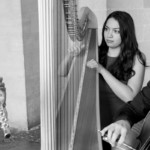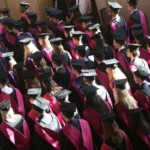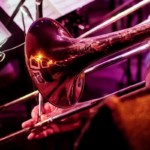Our roundup of some of the successes of Trinity Laban alumni.
This month alumni continued to stay active in the community during lockdown.
Clarinet alum Elliott DeVivio invited people in the UK to play ‘Ode to Joy’ from windows and doorways during the clap for the NHS on Thursday 7 May, with donations going to NHS Charities and Help Musicians UK. Stjepan Hauser also helped to raise funds and awareness, filming a solo cello concert to support the COVID-19 Solidarity Response Fund and to thank frontline workers around the world. Watch Stjepan play a set including Bach, Puccini and Mascagni in isolation in his Croatian hometown.
Following cancelled work playing live music on hospital wards, alum Jess Tomlinson’s Healbeats duo decided to record music to send to hospitals instead. Find out how you can support their work in this video.
Filmed and edited by award-winning filmmaker and dance alum Roswitha Chesher, Greenwich Dance created an online version of their ‘Up My Street: SHOWTIME!’ project designed specifically for residents, families and communities of Greenwich to participate in during lockdown.
Vocal alum Lucy Drever was announced as a music leader in the Benedetti Foundation’s new virtual workshop initiative. We caught up with Lucy to hear about her work in education and upcoming projects.
In our online Industry Insights series, we welcomed back two Musical Theatre alumni. Lori-Jane McLean shared her experience of performing in Six the Musical and Jochebel Ohene MacCarthy discussed her recent roles in The Lion King UK tour and the Ghost International tour.
Many alumni continued to provide online resources for all of us at home during quarantine. Kieran Leonard gave an online percussion lesson for international Bodhrán summer school Bula Buzz, while alum and Trinity Laban bassoon professor Phil Turbett introduced the variety of bassoons he plays for English Touring Opera in their new online series, ‘Warm Technical’.
Nefeli Tsiouti of Project Breakalign led an online session giving tips for hip hop dancers on safe practice for home training sessions during lockdown, Anna Der-Pahlen led daily yoga sessions as part of L’Officiel Magazine’s ‘L’Officiel on Tour’ Instagram series and Musical Theatre alumni Becky Hoyle and Ruth Seager led ‘Daily Dance’ classes for people to participate in over Zoom as well as inviting their neighbours to dance in front of their houses.
The Yard Theatre provided a full day of online shows to help entertain us at home, featuring marikiscrycrycry’s (Malik Nashad Sharpe) recent dance work I’ll Be Lucina.
The world of dance science saw many contributions from alumni this month. Dance alumni Farah Fadzali, Charmaine Tay and Reina Teh have set up new website Scape for dancers in Singapore and Southeast Asia. Read Farah’s article on the importance of dance science in Singapore or read Reina’s fact sheet debunking the myths of resistance training.
Simone Sistarelli gave an interview in Hanna Wroblewski’s online series ‘Creative Creatures’, discussing his project Popping For Parkinson’s and the importance of dance for both mental and physical health.
In May alumni continued to showcase their talents in live performance. Trinity Laban hosted an online concert from award-winning oboist and alum Olivia Fraser on our Facebook page, while our YouTube channel saw the live premiere of all-female dance collective Mass Hysteria’s new work in this.net.
MOBO and Jazz FM nominated saxophonist Camilla George gave an online performance as part of the Serious Livestream Sessions. Find out more about what Camilla’s been up to in this interview with London Jazz.
National Dance Company Wales recreated Alexandra Weistall’s 2067:Time and Time and Time for all their dancers to perform at home, including alum Camille Giraudeau.
The end of the month saw the TV premiere of the BalletBoyz 20th anniversary show Deluxe. Part of the BBC’s Culture in Quarantine Festival, the show featured dancer Matthew Sandiford, choreography by Maxine Doyle and music by Cassie Kinoshi.
Award-winning composer and saxophonist Cassie was also announced as one of three newly elected members of the Ivors Academy’s Jazz Committee and her SEED Ensemble was nominated for two Parliamentary Jazz Awards alongside fellow alumni Cherise Adams-Burnett, Nubya Garcia and Steve Rubie.
Alumni Rosie Turton and Sam Eagles were among eight artists announced as the new participants in Serious’ Take Five annual programme, offering mentorship and opportunities to emerging jazz and improvising musicians from across the UK.
Elliot Galvin was named as one of four artists to receive a Jerwood Jazz Encounters Fellowship; read more about the pianist’s plans for the fellowship in this interview. Elliot also started a weekly music series, releasing a new electronic composition every Wednesday on Soundcloud.
Other new music released this month included Oscar Jerome’s new single ‘Your Saint’, from his upcoming debut studio album Breathe Deep, and new album To The Earth from Laura Jurd’s Dinosaur, which received wide critical acclaim and gained four-star reviews from The Guardian and The Times.
Also garnering praise were Shirish Malhotra’s “roguish melodies on the clarinet and alto saxophone” on Ape Echoes’ debut album Charlie Dreams of Escape and Nubya Garcia’s new single ‘Pace’, featuring Joe Armon-Jones on keys and Daniel Casimir on bass.
2019 Innovation Awardee James Layton gave followers a sneak peek of his upcoming viola album with his piece ‘Wandering’ while composition alum Emanuele Carbone released new work ‘The Stellar Space Eye’, a collaborative project completed remotely by musicians living in both London and Los Angeles.
Kairos 4tet released their new single ‘The Body Keeps the Score’. Inspired by frontman Adam Waldmann’s grandmother, the track also features fellow alum and longstanding collaborator Emilia Mårtensson on vocals.
More dance came to our screens this month when renowned choreographer Rosemary Lee released her 1995 film boy on YouTube and dance alum and movement director Robbie Synge featured in Forest Floor, listed by the Financial Times as one of the best films to stream at home during quarantine.
Transitions Dance Company alum David Ogle choreographed and starred in Sounds of System Breakdown’s remotely-filmed music video for their new single ‘Connect With Me’, also featuring alumni Lisa Rowley, Tim Chew and Ryan O’Neill.
Sadler’s Wells saw hip hop dance meet live music in their Breakin’ Convention online festival starring the Jazz re:freshed Sonic Orchestra and a host of alumni, including Rosie Turton, Wayne Francis, Nubya Garcia, Jay Phelps, Sheila Maurice Grey and Ayanna Witter-Johnson. Hear more from Ayanna in this episode of TNMEA’s ‘Keeping the Beat’ interview series and listen to her new composition ‘Fairtrade?’, commissioned and performed by the London Symphony Orchestra in response to the mistreatment of workers in the fashion industry.
The award-winning cellist and singer Ayanna also featured in composition alum Max De Lucia’s newest instalment of ‘Lockdown Experiment’, created by musicians in isolation around the world. Hear the sounds of percussion alum Manu Delago on hang in this recording, and again in singer Douglas Dare’s track ‘Wherever You Are’.
Alumni continued to entertain with fun music videos this month. In a collaboration between 27 musicians from 8 different countries, MultiTraction Orchestra created new track ‘Emerge Entangled’, featuring alum Rosanna Ter-Berg on flute, while Virtual Big Band released a video of their multi-track online performance of ‘I Want You Back‘ by the Jackson 5 with lead vocals from Ineza Kerschkamp and arrangement by Louise Balkwill.
Vocal alum Ellie Turner joined forces with her parents Paul and Mandy, both of whom studied at Trinity College of Music, to perform ‘The Sun Whose Rays Are All Ablaze’ from The Mikado and award-winning composer Jeff Wayne teamed up with Gary Barlow to perform in his online series ‘Crooner Sessions’.
Coming Up
Don’t miss Million Square performing in the Serious Livestream Sessions on Friday 12 June, 19.00. Formed of saxophone alum Duncan Eagles and electronic artist Max Luthert, the duo will perform their brand-new release Spirit Bloom along with material from previous albums.
Soprano Jessie Tse will lead a live-streamed concert of programme of songs, arias and piano work found in the literary world of author Haruki Murakami. Tune in at 18.00 BST on Saturday 6 June to hear Jessie perform alongside baritone Przemyslaw Baranek and pianist Danor Quinteros.
Alum Manuel Arellano Bover’s Siegfried Camerata will continue their ‘Music Talks’ series on Zoom this Saturday, 11.00 BST, inviting String faculty staff John Crawford to discuss freedom of movement in playing and performance.
James Layton has curated the first ‘Into the Ocean’ online concert, showcasing solo viola music by young composers, performed by Stephen Upshaw, which will be premiered on YouTube 19.00 on Friday 19 June.











